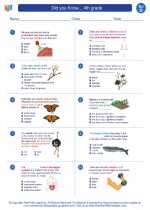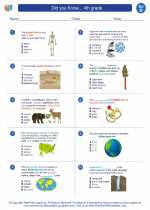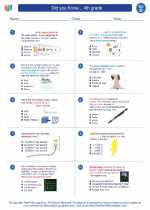Did you Know... 4th grade -> consumers
Consumers
In an ecosystem, consumers are organisms that cannot produce their own food and must obtain energy by consuming other organisms. They are vital to the flow of energy and nutrients through the food chain.
Types of Consumers
- Herbivores: These are consumers that primarily feed on plants. Examples include cows, rabbits, and deer.
- Carnivores: These consumers primarily feed on other animals. Examples include lions, wolves, and hawks.
- Omnivores: These consumers eat both plants and animals. Humans, bears, and raccoons are examples of omnivores.
- Detritivores: These are consumers that feed on decaying organic matter. Examples include earthworms, millipedes, and dung beetles.
Roles of Consumers
Consumers play a crucial role in the ecosystem by controlling the population of other organisms and recycling nutrients. They help in maintaining the balance of the ecosystem by preventing overpopulation of certain species and promoting biodiversity.
Study Guide
Here are some key points to remember about consumers:
.◂Science Worksheets and Study Guides Fourth Grade. Did you Know... 4th grade
Study Guide Did you Know... 4th grade
Did you Know... 4th grade  Worksheet/Answer key
Worksheet/Answer key Did you Know... 4th grade
Did you Know... 4th grade  Worksheet/Answer key
Worksheet/Answer key Did you Know... 4th grade
Did you Know... 4th grade  Worksheet/Answer key
Worksheet/Answer key Did you Know... 4th grade
Did you Know... 4th grade 

 Worksheet/Answer key
Worksheet/Answer key
 Worksheet/Answer key
Worksheet/Answer key
 Worksheet/Answer key
Worksheet/Answer key

The resources above cover the following skills:
Core Ideas for Knowing Science
Life Science
Organisms are organized on a cellular basis and have a finite life span.